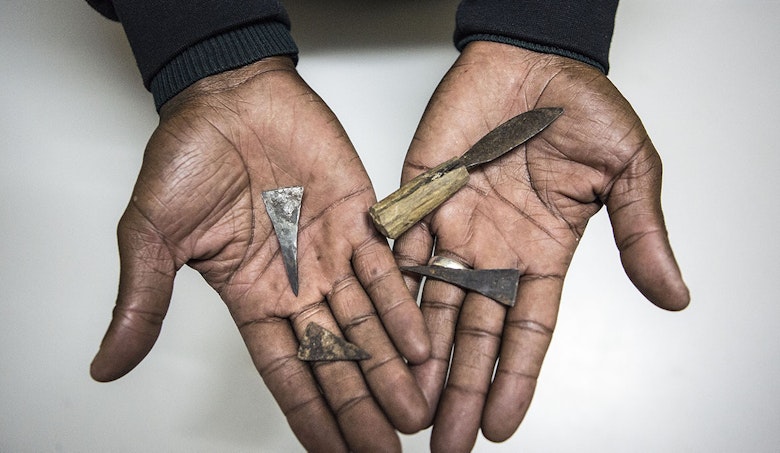GIVE a voice to exploited children with disabilities in Tanzania
In Tanzania, many girls undergo Female Genital Mutilation (FGM). The practice is illegal, yet approximately 7.9 million women and girls in Tanzania have undergone the ritual. In the Tarime district in the north, 75% of girls aged 9 to 17 undergo Female Genital Mutilation annually. Girls with disabilities are easy targets; they are often hidden in their homes and subjected to sexual violence. Together with our partner ATFGM, in the GIVE project we give a voice to exploited children with disabilities so that they can stand up for themselves.
Lydia Kaugi
Lydia Kaugi, programme coordinator Tanzania
Background
Female genital mutilation (FGM) is a form of gender-based violence. FGM is illegal in Tanzania, but the Kuria people of the north still consider it an important cultural practice. In the Mara region, where the Tarime district is located, various traditional norms and values strongly oppress women and girls. These oppressive norms hinder the sexual reproductive and health rights of girls and often bring an unsafe environment for all children.
In addition, discrimination of girls and boys with a disability is structurally entrenched in Tanzanian society. Many of them live invisibly in isolation with their relatives. They are often kept indoors, out of sight. Interaction with peers or adults in whom they could confide, is limited. The stigma surrounding disability prevents families, communities and authorities from taking the rights and needs of these children seriously.
Tanzanian children with a disability are vulnerable to violence, especially children with albinism and those with autism. They lack access to education, child protection and medical, psychosocial, legal and other services, including reporting mechanisms.
Problems
Children with a disability face multiple, interlinked problems in Tanzania:
Goals
With this project we continue our previous efforts on FGM in the same area. From the community interactions held during that project, we have learnt that many children with disabilities are hidden in their homesteads and therefore run a double risk. In the current project we specifically focus on children with a disabiliy.
Our overall objective is to amplify voices of children with a disability in Mara region. We aim to enable them to access inclusive child protection services, by:
Approach
The GIVE project will be implemented by our partner, the Association for Termination of Female Genital Mutilation (ATFGM) in close cooperation with SHIVYAWATA (the federation of people with disabilities) and the department of Social Welfare.
To give exploited children with a disability a voice in northern Tanzania, our approach includes the following activities:
Partner
Terre des Hommes Netherlands is partners with ATFGM to stop FGM and child marriage in the Kuria community in Tanzania.
The Association for the Termination of Female Genital Mutilation (ATFGM) was established in response to the concerns of several parents of the KurIa community who did not want their daughters to be mutilated. Girls themselves came to ask for protection as well, since they did not want to undergo the forced Female Genital Mutilation (FGM). ATFGM helps to educate the community, promotes respect of human dignity and human rights, with the ultimate goal to, together with the government, bring positive change and eradicate FGM.
Latest news
Trisper: Thriving in school and empowered to know her rights and pursue her dreams
Trisper*, 13 years old, suffered from polio illness resulting in disability at the tender age of 7 years. This…
The Global Research Agenda
On February 1 2024, the Terre des Hommes Netherlands Global Research Agenda was launched, which will guide our…
Rescued from FGM, trained on child rights and now chasing her dreams
Gati, a 17-year-old girl from Tanzania suffered an illness when she was a child, resulting in disability. View…
Tabitha: “I will empower other girls who have undergone FGM to find their confidence and voices.”
17-year old Tabitha* lives in a village in Tanzania. In the midst of the cutting season, she became a survivor…
Bhoke stands up for children with disabilities.
Bhoke (16) was born without a disability. But as a baby, she contracted malaria, and due to medical complicati…
Nadia wants to become a teacher
Nadia (6) lives in rural Tanzania and recently started attending primary school. The girl is in grade three an…
Nadia's dream of becoming a teacher
Nadia (6) lives in rural Tanzania and recently started attending primary school. She is in grade three and is…
Annual report 2018
Thanks to your support, in 2018 we were able to work on tackling child labor in the mica mines in India, child…
Results
In our fight against FGM in Tarime district, a lot has already been achieved:
- 4,741 girls have been saved from FGM and taken care of
- 22 girls have been supported to attend university, 14 of which have since graduated.
- 6 girls have followed and completed teacher training and one girl is still studying, 70 girls (of which 1 with a disability) have completed vocational training and 12 girls are still in vocational training.
- 94 girls are actively approaching and educating peers to create more awareness within the community.
- 193 children's rights clubs are active, of which 123 in primary schools and 70 in secondary schools.
- 86 new participants have joined the child rights clubs.
- 12 traditional cutters have stopped mutilating and are actively campaigning against FGM.

